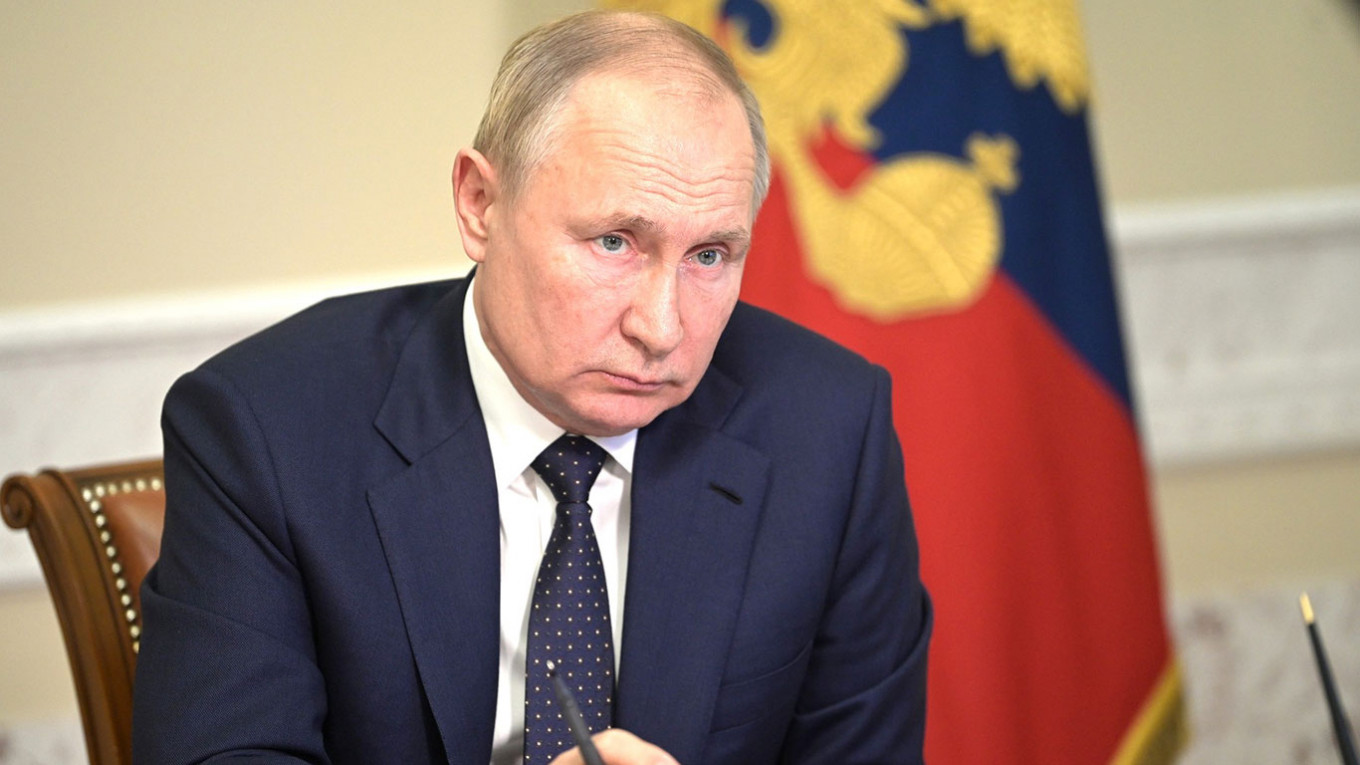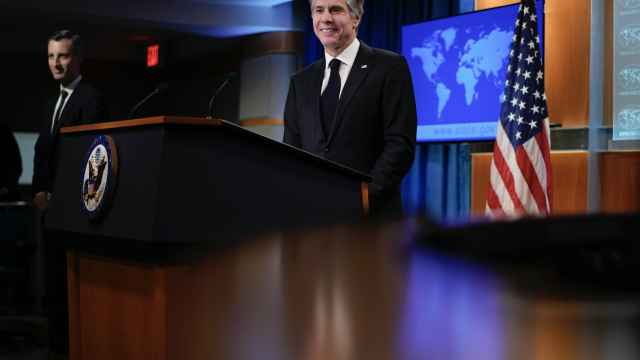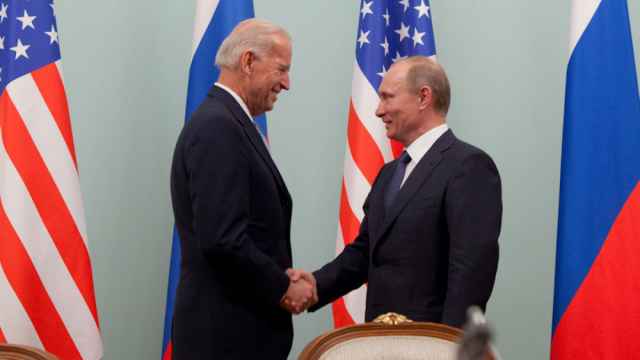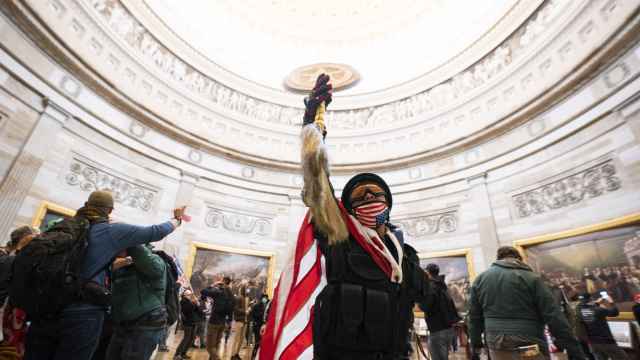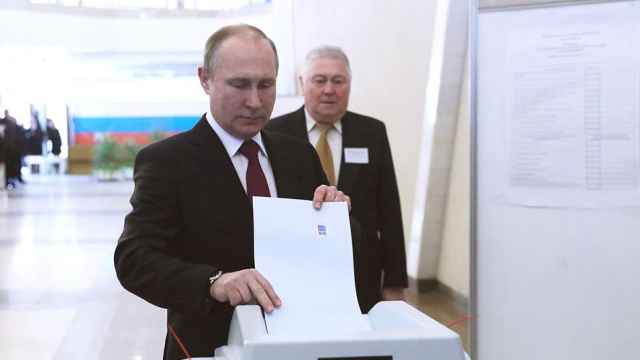Russia hit back Wednesday at U.S. threats of direct sanctions against President Vladimir Putin, saying moves against the Russian leader would be ineffective and hurt efforts to lower tensions over Ukraine.
Officials from France, Germany, Russia and Ukraine met for talks in Paris in the latest bid to ease a crisis sparked by fears that Moscow is preparing an invasion of its pro-Western neighbor.
The West has warned Russia of severe consequences if it does invade, and on Tuesday, Washington said there could be sanctions personally targeting Putin.
Reacting to the news, Kremlin spokesman Dmitry Peskov dismissed the threats as worthless because senior Russian officials are barred from holding assets abroad.
But such a move, he said, would do serious damage to diplomatic attempts to ease ratcheting tensions over Ukraine.
"Politically, it's not painful, it's destructive," Peskov told reporters.
The Kremlin has previously said any U.S. sanctions personally targeting Putin would be akin to crossing a red line, warning the move could result in a rupture of bilateral ties.
U.S. President Joe Biden said Tuesday that any Russian military attack on Ukraine would trigger "enormous consequences" and could even "change the world."
High-tech export sanctions
Echoing Biden's message, a senior U.S. official described potential economic sanctions "with massive consequences" that would go far beyond measures implemented in 2014 after Russia annexed Ukraine's Crimea region.
The official said new measures would include restrictions on exports of high-tech U.S. equipment in the artificial intelligence, quantum computing and aerospace sectors.
Cutting Russia off from these technologies would hit Putin's "strategic ambitions to industrialize his economy quite hard," the official said.
The speaker of Russia's lower house said Wednesday that Washington's threat against Putin showed the U.S. "wants a loyal Russian president that it can control."
"The United States is not happy that under President Vladimir Putin, the Russian Federation has become strong and independent," Vyacheslav Volodin wrote on social media.
A senior Russian lawmaker meanwhile called on the Kremlin to arm pro-Russian separatists in eastern Ukraine saying "the Kyiv regime must be stopped."
Andrei Turchak, an official in Putin's United Russia party, said Russia "must provide" weapons to "deter military aggression clearly being prepared by Kyiv."
During weeks of talks between Russian, U.S. and European diplomats, Western leaders have repeatedly warned of far-reaching economic measures against Moscow in the event of an attack.
The talks in Paris Wednesday are bringing together one of Russia's deputy prime ministers and a senior aide to Ukrainian President Volodymyr Zelenskiy, as well as diplomatic advisors to French President Emmanuel Macron and German leader Olaf Scholz.
Negotiations so far have failed to ease tensions, though Washington and Moscow have agreed to keep talking.
Russia to take 'necessary measures'
Russia has said it expects this week to receive written U.S. responses to sweeping security demands Moscow made last year that seek to dramatically limit NATO's reach and capabilities in Eastern Europe and the ex-USSR.
Russia Foreign Minister Sergei Lavrov warned in an address to lawmakers Wednesday that Moscow would take "all necessary measures" if it didn't receive constructive responses and if the West continued its "aggressive policy."
A senior Western diplomat said later that NATO was close to finalising its response, describing many of the Russian demands as "unacceptable or unrealistic."
The diplomat, however, identified areas where NATO could "work on their concerns."
Moscow has meanwhile announced a spate of military drills including in Belarus, and said Tuesday it would hold fresh exercises involving 6,000 troops near Ukraine and within the Crimea region.
As part of separate naval exercises announced this month, Russia warships entered the Barents Sea on Wednesday, the North Fleet said in a statement.
The West has accused Russia of massing some 100,000 troops along the Ukrainian border.
Ukrainian Foreign Minister Dmytro Kuleba said Wednesday that the number of Russian troops "is insufficient for a full-scale offensive" but does pose "a direct threat" to Ukraine.
Fears of a Russian invasion follow on from Moscow's annexation of the Crimean peninsula in 2014 and the capture by pro-Kremlin separatists of two self-proclaimed breakaway republics in Ukraine's east.
More than 13,000 people have died in the fighting between government forces and the pro-Russian rebels.
A Message from The Moscow Times:
Dear readers,
We are facing unprecedented challenges. Russia's Prosecutor General's Office has designated The Moscow Times as an "undesirable" organization, criminalizing our work and putting our staff at risk of prosecution. This follows our earlier unjust labeling as a "foreign agent."
These actions are direct attempts to silence independent journalism in Russia. The authorities claim our work "discredits the decisions of the Russian leadership." We see things differently: we strive to provide accurate, unbiased reporting on Russia.
We, the journalists of The Moscow Times, refuse to be silenced. But to continue our work, we need your help.
Your support, no matter how small, makes a world of difference. If you can, please support us monthly starting from just $2. It's quick to set up, and every contribution makes a significant impact.
By supporting The Moscow Times, you're defending open, independent journalism in the face of repression. Thank you for standing with us.
Remind me later.


